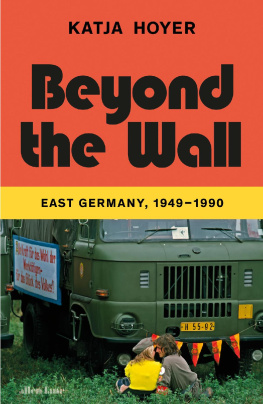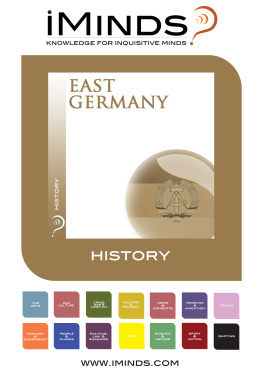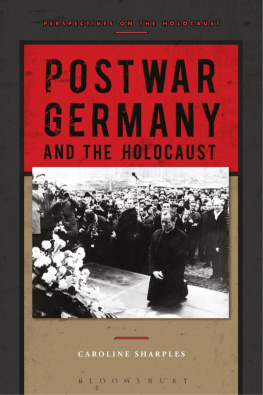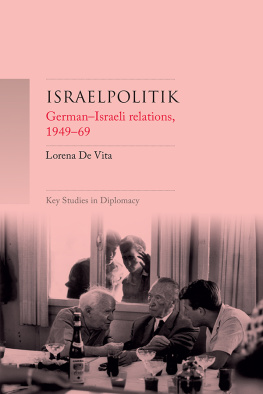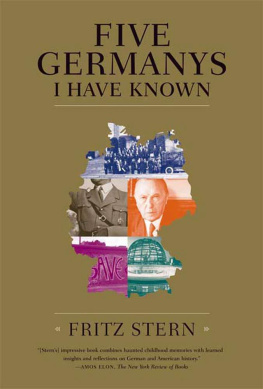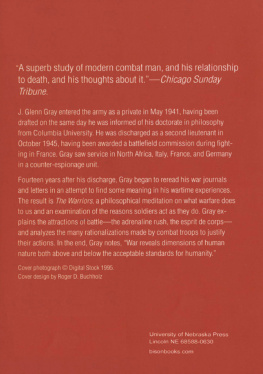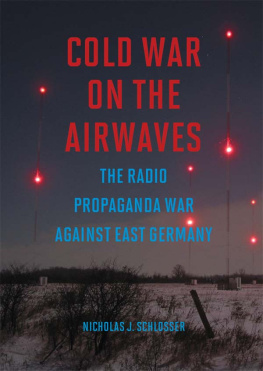2003
The University of North Carolina Press
All rights reserved
Set in Charter and Meta types
by Keystone Typesetting, Inc.
Manufactured in the United States of America
The paper in this book meets the guidelines for
permanence and durability of the Committee on
Production Guidelines for Book Longevity of the
Council on Library Resources.
Library of Congress Cataloging-in-Publication Data
Gray, William Glenn.
Germanys cold war : the global campaign to isolate
East Germany, 19491969 / by William Glenn Gray.
p. cm.
Includes bibliographical references and index.
ISBN 0-8078-2758-4 (alk. paper)
1. Germany (West)Foreign relations. 2. Germany (West)Economic policy. 3. Germany (West)Foreign relationsGermany (East) 4. Germany (East)Foreign relationsGermany (West) 5. Hallstein, Walter, 1901 6. Recognition (International law) 7. World politics 1945 I. Title.
DD259.5 .G46 2003
327.43043109045dc21 2002006444
07 06 05 04 03 5 4 3 2 1
Acknowledgments
Specialists in German history will have already flipped to the back; the list of archival sources there will tell them all they need to know about the making of this book. Such readers can probably anticipate many of the names I am about to mention. For all other interested readersand for the pleasure of my own personal recollectionI shall make an effort to identify here the many individuals who have assisted me in the course of this six-year endeavor.
My first debt is to the professors and students of Yale University. Seminars led by Henry Ashby Turner Jr. and Paul M. Kennedy, my two principal mentors, yielded the immediate inspiration for the book at hand. To them I owe an abiding interest in relating German topics to the broader currents of international history. Students who passed through Yale in the 1990s had the pleasure of seeing Paul Kennedys research group, International Security Studies, blossom into one of the countrys premier venues for the promotion of multiarchival, truly cosmopolitan history. Thanks go out to Ann Carter-Drier and Rose Pawlikowski for running a tight ship, and to the institutes associated facultyamong them Bruce Russett, John Gaddis, Will Hitchcock, and Ted Bromundfor bringing to Yale a constant stream of guests from the worlds of academia, diplomacy, and beyond. For me personally, ISS was a welcoming environment on many levels: intellectual, social, material. Not least, I am thankful to the institute and to the Smith Richardson Foundation for funding my original research in 199697. There is, of course, much more to Yale than ISS: Professors John Merriman, Jay Winter, and Diane Kunz were outstanding teachers; Suzanne Roberts at Sterling Memorial Library was most helpful in collecting papers of relevance to my project; and Florence Thomas guided me and many a graduate student through the mysterious institutional corridors.
At work in the field, I found no exceptions to the general rule that German archivists are extraordinarily knowledgeable and professional. Knud Piening at Germanys Foreign Office was friendly as well; he and his colleagues helped to make my months there enjoyable and productive. Much the same can be said for Hans-Otto Kleinmann at the Archive for Christian-Democratic Politics in St. Augustin and Christoph Stamm at the Archive of Social Democracy in Bonn. My stay at the Archive of German Liberalism in Gummersbach was brief, and my visits to the Konrad Adenauer House and the Ludwig Erhard Foundation even briefer; but that is all the more reason to thank Monika Fassbender, Engelbert Hommel, and Andreas Schirmer, respectively, for helping me find the essentials quickly. Happily, I was able to spend many weeks at the Federal Archives in Koblenz, where the Herren Hoffmann and Braband provided excellent advice about the files of the Ministries for Development Aid and All-German Affairs. That I had access to two important collections there, the papers of Heinrich von Brentano and Baron von und zu Guttenberg, was due solely to the kindness of Michael von Brentano and Baroness Guttenberg. One final stop of special import during that trip was the Press and Information Office in Bonn, where Frau Klimmer supplied me with great stacks of newspaper clippings.
To my delight, I learned that Germany does not have a monopoly on top-notch archivists. At the Quai dOrsay in Paris, Grgoire Elden was kind enough to communicate with me in German, sparing me from having to explain my project in broken French orworse stillAmerican English. He placed at my disposal temporary finding aids for the years 196070, material which he was only then cataloging. If there was any period of my research that was more fruitful than those weeks in Paris, it can only be the month spent at the National Archives in College Park, Maryland. (No doubt the liberal photocopying policies at both sites are part of the explanation.) The NARA is typically an anonymous environment, but on several occasions Ken Heger proved himself a competent guide through the tangle of finding aids. I have no one in particular to thank at the Public Record Office in London, but the smooth functioning of the vast operations there is surely testimony to British administrative prowess.
From the beginning, audiences and individual readers supplied me with helpful comments. Among the first was Klaus Hildebrand, who graciously allowed me to air provisional conclusions to his Oberseminar in Bonn in April 1997. Upon my return to New Haven, readers included Jeremi Suri, Tom Maulucci, and a very special dissertation group consisting of Fernande Scheid, Michael Shurkin, and Richard Lofthouse. Pertti Ahonen, now at Sheffield, shared all of his own chapters on West German expellees with me while providing thoughtful observations about my work. More recently, Paul Steege at Villanova and Brian Vick at Stanford have demonstrated collegiality and friendship with their comments on portions of the revised manuscript. Those revisions are, in turn, a reflection of upbeat and insightful readers reports by Marc Trachtenberg and Thomas Alan Schwartz; I thank them for their suggestions and hope that they find the changes to their liking. Of all readers, Henry Turner has been the most attentive: in matters of both style and substance, the guidance provided by this master historian is exemplary.
For a dissertation to become a book, scholars typically require a period of contemplation and an injection of fresh archival sources. During the academic year 19992000, New York Universitys Remarque Institute proved instrumental in both regards. Tony Judt and Jair Kessler have fashioned a marvelous center for European studies at the southern end of Washington Square Park. Their biweekly seminars at the Remarque are noteworthy for creative catering and, more importantly, the informality and intensity of discussion. I am also thankful to Volker Berghahn for introducing me to his doctoral group at Columbia University. Understandably, then, I did not gladly take leave of New York in the fall of 2000; but I have been delighted to discover just how stimulating intellectual life can be on the South Plains when ones colleagues are as engaged as those at Texas Tech University. Thanks to the leadership of Allan Kuethe and now Bruce Daniels, Lubbock has become a congenial place to do European history. I must resist the temptation to list all the members of my new department, but two have shown special interest in my career as a historian: David Troyansky and Patricia Pelley. Generous assistance by the Remarque Institute and the Texas Tech history department funded summers in Germany in the years 2000 and 2001, allowing me to expand the original scope of research to consider East German perspectives. Sylvia Grfe at the Federal Archives in Berlin-Lichterfelde and Ulrich Geyer at the Politisches Archiv des Auswrtigen Amts in Berlin provided invaluable orientations to the vast mountains of East German material.


